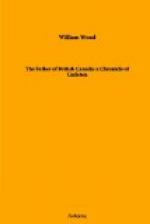The offended councillors went so far as to present Carleton with a remonstrance which Irving himself had the misfortune to sign. Carleton had consulted some members on points with which they were specially acquainted. The members who had not been consulted thereupon protested to Irving, who assured them that Carleton must have done so by accident, not design. But when Carleton received a joint letter in which they said, ’As you are pleased to signifye to Us by Coll. Irving that it was accident, & not Intention,’ he at once replied: ’As Lieutenant Colonel Irving has signified to you that the Part of my Conduct you think worthy of your Reprehension happened by Accident let him explain his reasons for so doing. He had no authority from me.’ Carleton then went on to say that he would consult any ’Men of Good Sense, Truth, Candour, and Impartial Justice’ whenever he chose, no matter whether they were councillors or not.
The Walker affair, which now broke out again, was much more serious than the storm in the Council’s teacup. It agitated the whole of Canada and threatened to range the population of Montreal and Quebec into two irreconcilable factions, the civil and the military. For the whole of the two years since Murray had been called upon to deal with it cleverly presented versions of Walker’s views had been spread all over the colonies and worked into influential Opposition circles in England. The invectives against the redcoats and their friends the seigneurs were of the usual abusive type. But they had an unusually powerful effect at that particular time in the Thirteen Colonies as well as in what their authors hoped to make a Fourteenth Colony after a fashion of their own; and they looked plausible enough to mislead a good many moderate men in the mother country too. Walker’s case was that he had an actual witness, as to the identity of his assailants, in the person of McGovoch, a discharged soldier, who laid information against one civilian, three British officers, and the celebrated French-Canadian leader, La Corne de St Luc. All the accused were arrested in their beds in Montreal and thrown into the common gaol. Walker objected to bail on the plea that his life would be in danger if they were allowed at large. He also sought to postpone the trial in order to punish the accused as much as possible, guilty or innocent. But William Hey, the chief justice, an able and upright man, would consent to postponement only on condition that bail should be allowed; so the trial proceeded. When the grand jury threw out the case against one of the prisoners Walker let loose such a flood of virulent abuse that moderate men were turned against him. In the end all the accused were honourably acquitted, while McGovoch, who was proved to have been a false witness from the first, was convicted of perjury. Carleton remained absolutely impartial all through, and even dismissed Colonel Irving and another member of the Council for heading a petition on behalf of the military prisoners.




